The Intel Core i9-9980XE CPU Review: Refresh Until it Hertz
by Ian Cutress on November 13, 2018 9:00 AM ESTHEDT Performance: Office Tests
The Office test suite is designed to focus around more industry standard tests that focus on office workflows, system meetings, some synthetics, but we also bundle compiler performance in with this section. For users that have to evaluate hardware in general, these are usually the benchmarks that most consider.
All of our benchmark results can also be found in our benchmark engine, Bench.
PCMark 10: Industry Standard System Profiler
Futuremark, now known as UL, has developed benchmarks that have become industry standards for around two decades. The latest complete system test suite is PCMark 10, upgrading over PCMark 8 with updated tests and more OpenCL invested into use cases such as video streaming.
PCMark splits its scores into about 14 different areas, including application startup, web, spreadsheets, photo editing, rendering, video conferencing, and physics. We post all of these numbers in our benchmark database, Bench, however the key metric for the review is the overall score.
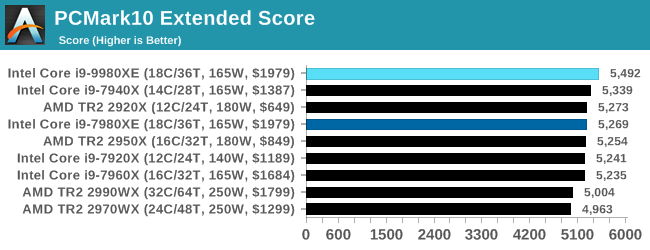
A small bump in the result here because of the added core frequency.
Chromium Compile: Windows VC++ Compile of Chrome 56
A large number of AnandTech readers are software engineers, looking at how the hardware they use performs. While compiling a Linux kernel is ‘standard’ for the reviewers who often compile, our test is a little more varied – we are using the windows instructions to compile Chrome, specifically a Chrome 56 build from March 2017, as that was when we built the test. Google quite handily gives instructions on how to compile with Windows, along with a 400k file download for the repo.
In our test, using Google’s instructions, we use the MSVC compiler and ninja developer tools to manage the compile. As you may expect, the benchmark is variably threaded, with a mix of DRAM requirements that benefit from faster caches. Data procured in our test is the time taken for the compile, which we convert into compiles per day.
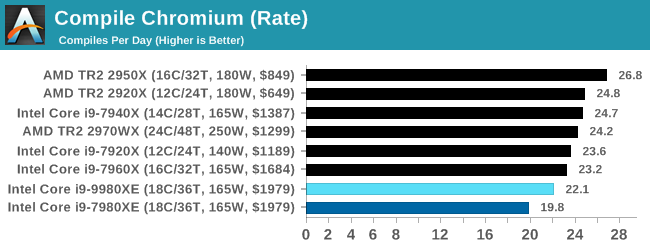
For the compile test, the 9980XE brings the 18-core up to being more competitive, however this test does seem to prefer fewer cores, lower crosstalk, and higher frequencies. AMD's 16-core TR2 wins here, adding 20% perf over the 9980XE for under half the cost.
3DMark Physics: In-Game Physics Compute
Alongside PCMark is 3DMark, Futuremark’s (UL’s) gaming test suite. Each gaming tests consists of one or two GPU heavy scenes, along with a physics test that is indicative of when the test was written and the platform it is aimed at. The main overriding tests, in order of complexity, are Ice Storm, Cloud Gate, Sky Diver, Fire Strike, and Time Spy.
Some of the subtests offer variants, such as Ice Storm Unlimited, which is aimed at mobile platforms with an off-screen rendering, or Fire Strike Ultra which is aimed at high-end 4K systems with lots of the added features turned on. Time Spy also currently has an AVX-512 mode (which we may be using in the future).
For our tests, we report in Bench the results from every physics test, but for the sake of the review we keep it to the most demanding of each scene: Cloud Gate, Sky Diver, Fire Strike Ultra, and Time Spy.
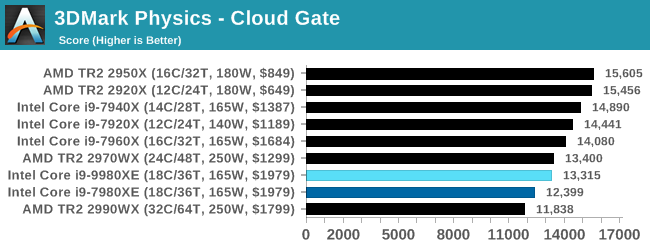
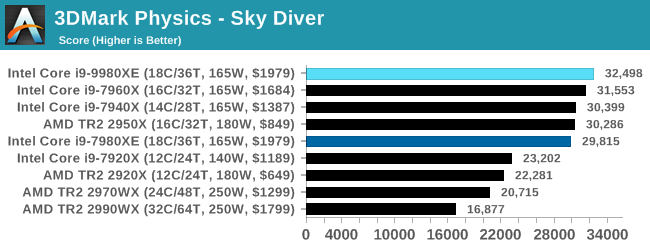
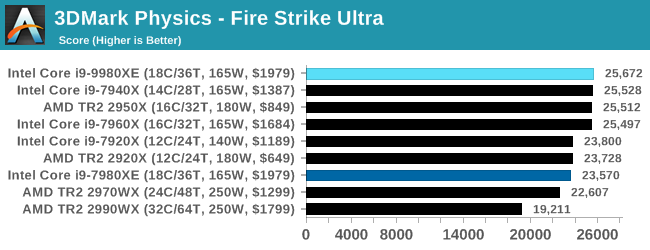
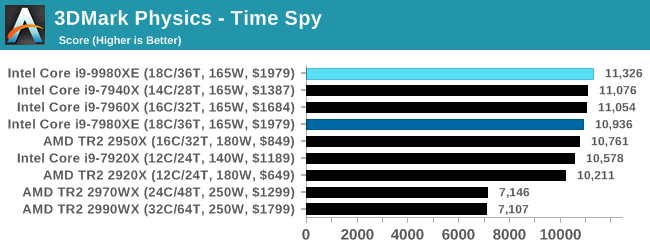
The newer engines can take advantage of the higher core count parts, and Intel's unified memory design also helps here.
GeekBench4: Synthetics
A common tool for cross-platform testing between mobile, PC, and Mac, GeekBench 4 is an ultimate exercise in synthetic testing across a range of algorithms looking for peak throughput. Tests include encryption, compression, fast Fourier transform, memory operations, n-body physics, matrix operations, histogram manipulation, and HTML parsing.
I’m including this test due to popular demand, although the results do come across as overly synthetic, and a lot of users often put a lot of weight behind the test due to the fact that it is compiled across different platforms (although with different compilers).
We record the main subtest scores (Crypto, Integer, Floating Point, Memory) in our benchmark database, but for the review we post the overall single and multi-threaded results.
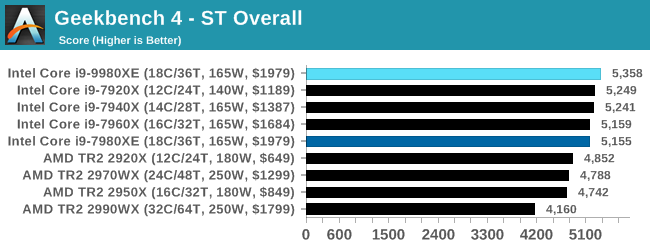
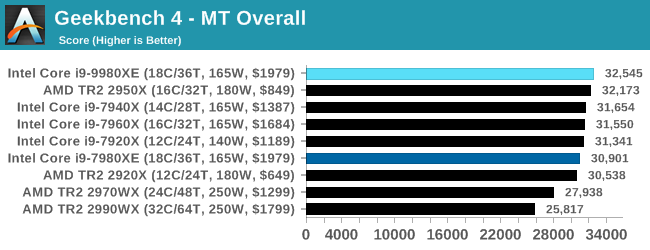










143 Comments
View All Comments
zeromus - Wednesday, November 14, 2018 - link
@linuxgeek, logged in for the first time in 10 years or more just to laugh with you for having cracked the case with your explanation there at the end!HStewart - Tuesday, November 13, 2018 - link
I have IBM Thinkpad 530 with NVidia Quadro - in software development unless into graphics you don't even need more than integrated - even more for average business person - unless you are serious into gaming or high end graphics you don't need highend GPU. Even gaming as long as you are not into latest games - lower end graphics will do.pandemonium - Wednesday, November 14, 2018 - link
"Even gaming as long as you are not into latest games - lower end graphics will do."This HEAVILY depends on your output resolution, as every single review for the last decade has clearly made evident.
Samus - Wednesday, November 14, 2018 - link
Don't call it an IBM Thinkpad. It's disgraceful to associate IBM with the bastardization Lenovo has done to their nameplate.imaheadcase - Tuesday, November 13, 2018 - link
Uhh yah but no one WILL do it on mobility. Makes no sense.TEAMSWITCHER - Tuesday, November 13, 2018 - link
You see .. there you are TOTALLY WRONG. Supporting the iPad is a MAJOR REQUIREMENT as specified by our customers.Augmented reality has HUGE IMPLICATIONS for our industry. Try as you may ... you can't hold up that 18 core desktop behemoth (RGB lighting does not defy gravity) to see how that new Pottery Barn sofa will look in your family room. I think what you are suffering from is a historical perspective on computing which the ACTUAL WORLD has moved away from.
scienceomatica - Tuesday, November 13, 2018 - link
@TEAMSWITCHER - I think your comments are an unbalanced result between fantasy and ideals. I think you're pretty superficially, even childishly looking at the use of technology and communicating with the objective world. Of course, a certain aspect of things can be done on a mobile device, but by its very essence it is just a mobile device, therefore, as a casual, temporary solution. It will never be able to match the raw power of "static" desktop computers.working in a laboratory for physical analysis, numerous simulations of supersymmetric breakdowns of material identities, or transposition of spatial-temporal continuum, it would be ridiculous to imagine doing on a mobile device.There are many things I would not even mention.HStewart - Tuesday, November 13, 2018 - link
For videos - as long as you AVX 2 (256bit) you are ok.SanX - Wednesday, November 14, 2018 - link
AMD needs to beat Intel with AVX to be considered seriously for scientific apps (3D particle movement test)PeachNCream - Tuesday, November 13, 2018 - link
All seven of our local development teams have long since switched from desktops to laptops. That conversion was a done deal back in the days of Windows Vista and Dell Latitude D630s and 830s. Now we live in a BYOD (bring your own device) world where the company will pay up to a certain amount (varies between $1,100 and $1,400 depending on funding from upper echelons of the corporation) and employees are free to purchase the computer hardware they want for their work. There are no desktop PCs currently and in the past four years, only one person purchased a desktop in the form of a NUC. The reality is that desktop computers are for the most part a thing of the past with a few instances remaining on the desks of home users that play video games on custom-built boxes as the primary remaining market segment. Why else would Intel swing overclocking as a feature of a HEDT chip if there was a valid business market for these things?